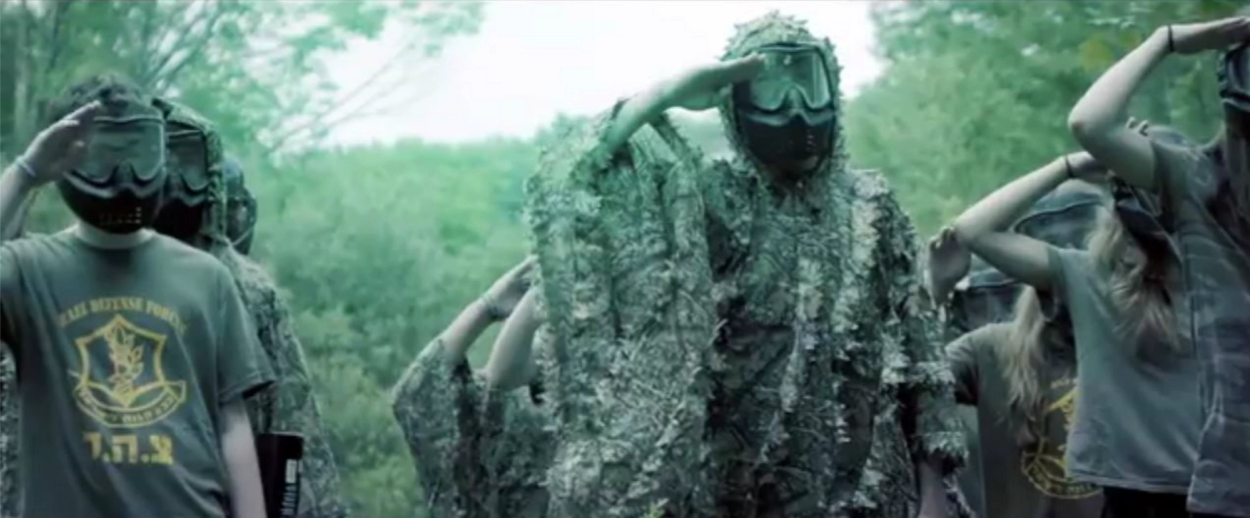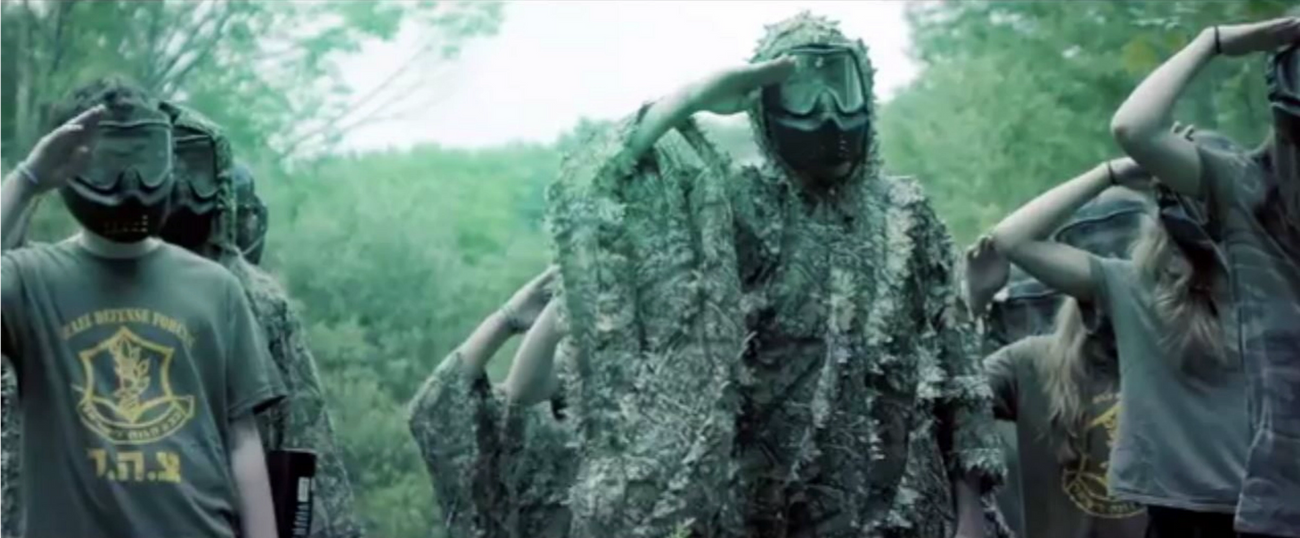Summer Camp Promotes IDF-Style Training Program for Youth
New York’s Camp Mesorah has published a video depicting its ‘IDF Training Paintball’ program that glorifies war—and tells campers to ‘enlist now’




A flagship Orthodox summer camp in New York is causing a stir because it operates what appear to be war game challenges among its young campers.
A promotional video titled “Camp Mesorah IDF Training,” posted on YouTube on Oct. 25, showcases its new-and-improved Israel Defense Force Training Paintball activity. In the video, kids are dressed in IDF T-shirts and wear camouflage clothing as they participate in a challenge course complete with ropes and monkey bars and black paintball guns. The boys in the video wear kippot while many of the girls don knee-length skirts, which is in keeping with traditional Orthodox practice. The activity instructor wears what resembles an army uniform. Set to an action movietype soundtrack, the trailer ends with an Israeli flag with the words “enlist now” over it, followed by “Camp Mesorah: The Jewish Sports Camp.”
The video garnered attention Oct. 28 when Yehuda Kurtzer, the President of the Shalom Hartman Institute of North America, posted it in a public Facebook post, prompting an eruption of conversation about the Israeli-Palestinian conflict, Jewish education, American Jewish identity, and gun control. Not to mention talk about promoting war games among kids—campers ages 9 and up are able to participate in the programming. The major critiques boiled down to “ glorification of weaponry,” as Kurtzer put it, and how the Modern Orthodox Religious Zionist camp educates campers around Israel, the Israeli-Palestinian conflict, and the IDF.
Camp Mesorah, a private summer camp in upstate New York, had more than 500 campers in 2015. The camp offers a variety of activities like swimming, sports, arts, and Jewish programming. The “IDF Training Paintball” program, as it is currently named, was launched three years ago and a full challenge course was added last summer.
An individual familiar with Camp Mesorah’s inner workings, who asked to remain anonymous, told me, “Anyone who values Jewish camping—I cannot imagine how they could have a positive response to [the activities depicted in] that video. I feel like the message (of the video) is ‘Welcome to Camp Mesorah—join ISIS!’ It even explicitly at the end says enlist today, which I know is a play on words.”
Denah Emerson, who spent a total of 12 summers at Mesorah as a camper and a staffer, expressed her shock at the “disturbing” video. “I draw the line at child soldiers,” she said. “I’m shocked even more people aren’t outraged.”
In response to request for direct comment from Camp Mesorah on Friday, co-directors of Camp Mesorah—Bergenfield-based Rabbi Ari Katz, and Rabbi Joseph Stansky of Monsey—said “these children are not going to a military camp,” adding that “the gentleman that ran it does have IDF experience and does add that kind of style to make it more exciting and fun for the kids.”
Mesorah is not the only camp with paintball as a camp-wide activity, and many of its competitors have similar programming. The campers “were attending a paintball program similar to what all camps offer,” Katz said in a phone interview. They added that the activity is similar to “what many families do on a chol hamoed [the days in the middle of the Sukkot and Passover holidays] trip or on an outing.”
Shaul Magid, a professor of Jewish and religious studies at Indiana University, said that “glorifying the IDF in the age of occupation is part of the problem.” The video, he said, “sanitizes violence and subtly promotes an ideology of muscle victimhood.”
Magid, a Senior Research Fellow at the Shalom Hartman Institute in New York, observed “a right-wing shift in American Modern Orthodoxy.” He cites the position of Rabbi Joseph B. Soloveitchik, the father of Modern Orthodoxy in the United States, to illustrate the shift in the Modern Orthodox practical stance on Israel: Soloveitchik’s position was “quite moderate, even left-leaning in regards to land for peace and Palestinian national aspirations,” Magid explained, “while that was decades ago, his position then would be out of the mainstream in today’s Modern Orthodox community.”
Sarah Groner, recalling her days at the camp in the late ’90s and early 2000s, said, “Besides singing ‘Hatikva,’ at the morning flag raising, they hardly had any Israel activities.” To Groner, the fact that this video is bring used as a marketing point to attract families “says a lot about where Modern Orthodoxy has evolved in the past 15 years.”
Rabbi Avi Orlow, the vice president for program and innovation at the Foundation for Jewish Camps, pointed out that this “was a recruitment video for parents to want to entice them to want to send their kids there.” He posed the question: “What are the assumptions that [the camp] was making of the desires and aspirations of the parents— that that’s what they wanted to see. There’s something that spoke to certain assumptions that are really interesting.”
In an email to parents and campers sent Tuesday, Katz and Stansky responded to the situation, writing, “We don’t glorify war and we don’t tolerate violence and we certainly don’t teach that we should use violence toward others. The video was exciting, exhilarating and fun. It depicted campers enjoying our paintball program and obstacle course and bonding through the activity.”
Rachel Delia Benaim is a freelance religion reporter. Her work has appeared in The Washington Post, The Daily Beast, and The Diplomat, among others. Follow her on Twitter @rdbenaim.